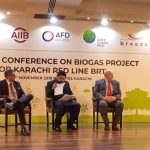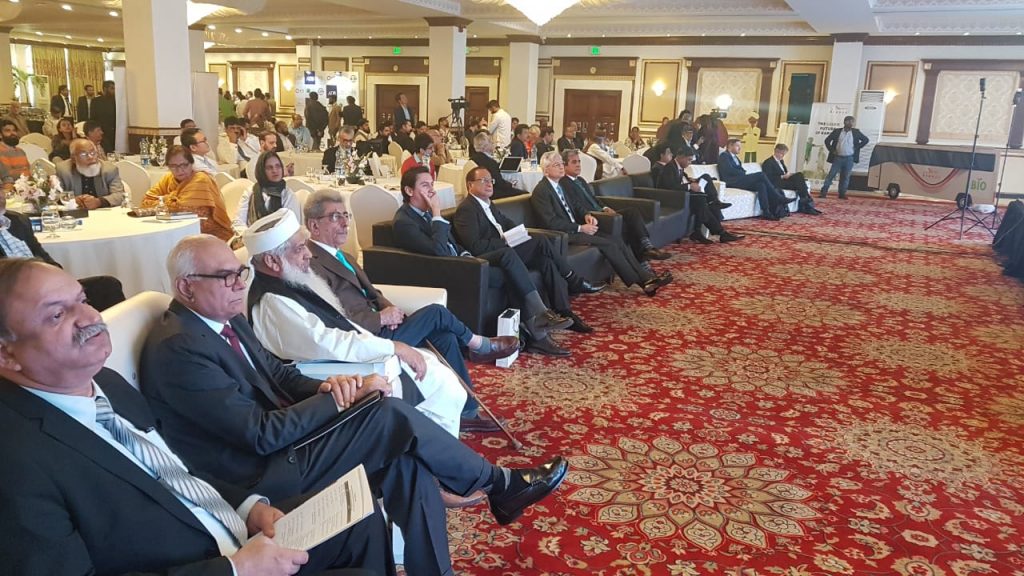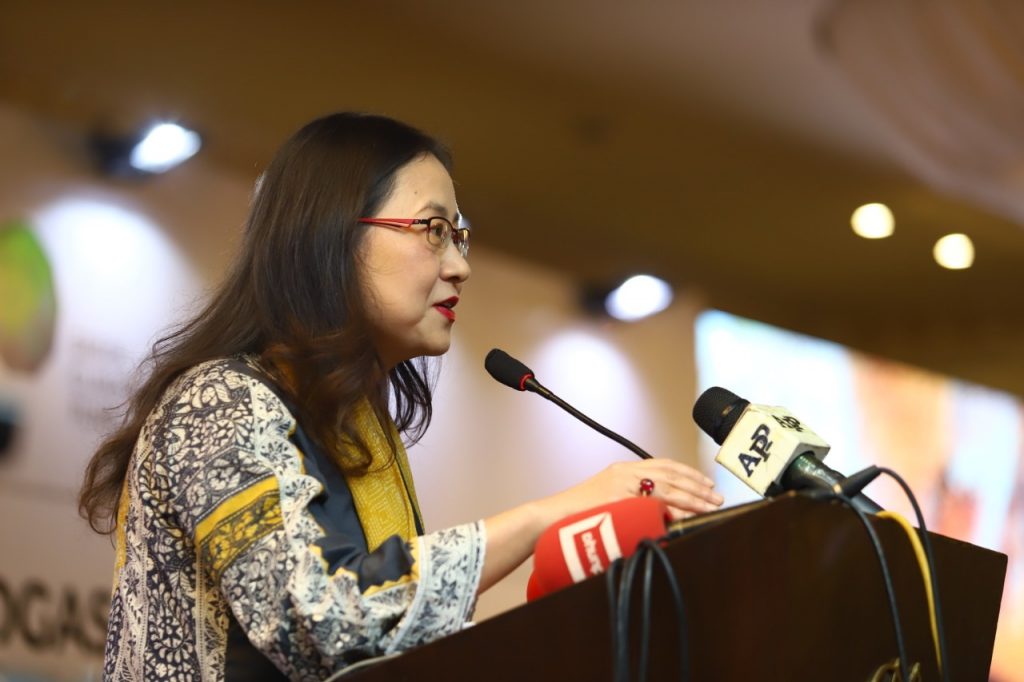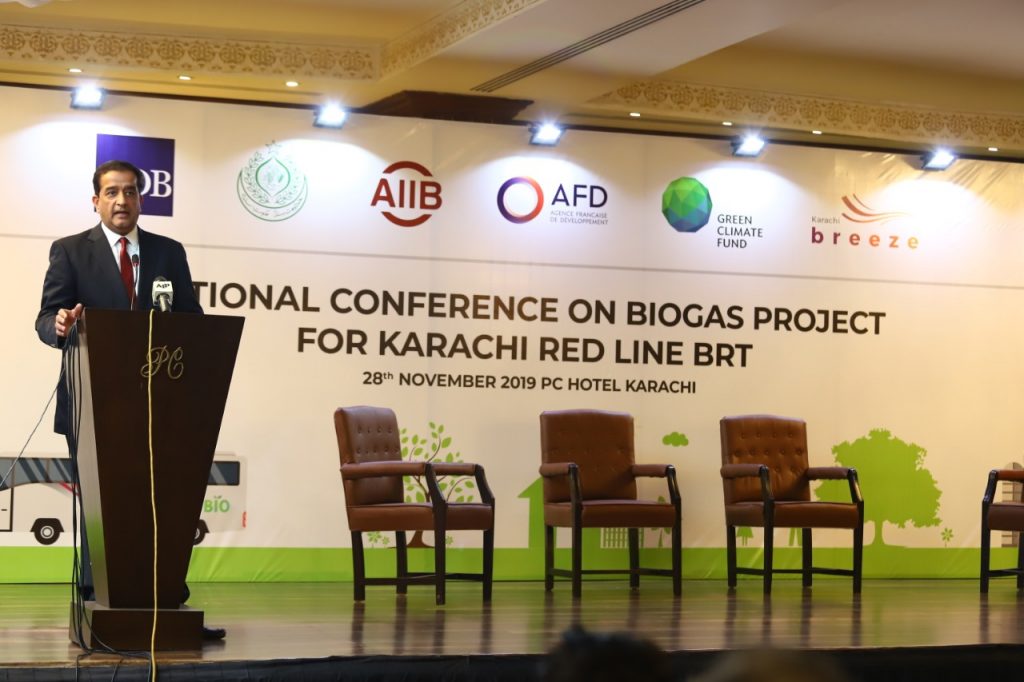KARACHI, PAKISTAN: The Karachi Breeze Red Line Project which is being implemented by the Government of Sindh, will be the first ever transport system in Pakistan to use bio-methane produced from animal waste as a fuel resource for its 213 bus fleet thus providing an efficient and affordable transport solution for citizens and significantly reducing carbon emission level from the city. The project will have an estimated cost of PKR 78, 384.33 million and will provide transport services for 300,000 people daily.
The feasibility and design for the biogas project was presented today at a national conference organized by the Asian Development Bank in collaboration with the Government of Sindh, UN Green Climate Fund (GCF), Asian Infrastructure Investment Bank and the Agence Française de Développement (AFD), all financiers of the Karachi Red Line BRT project.
According to the feasibility study, the Karachi Red Line BRT will have its own dedicated biogas plant located in the Landhi Cattle Colony, where 2,000 tons of cattle waste will be used to produce 60,000 Nm3 per day of biogas. The biogas plant will deliver 11 tons per day of Compressed Biomethane Gas (CBG) to the bus fleet, increasing to 17 tons over the life of the BRT line as demand increases.
In his welcome remarks, Mr. Imtiaz Ahmed Shaikh, Sindh Minister for Energy highlighted that the Red Line project is the world’s first transport project to receive funding from UN Green Climate Fund due to its use of an innovative and environment-friendly fuel resource. Mr. Shaikh stated that “The Red Line will not only solve the city’s mobility issues by providing a more reliable, safe and inclusive transportation system; it will also make the bus transport more cost-effective and reduce greenhouse gas emissions, improving the current pollution of the city”. Mr. Sheikh further stated that the biogas project will generate estimated total emission reductions of 127,000 tCO2e per year, delivering much greater reduction in greenhouse gases than any other technologies.
Mr. Malik Amin Aslam, Federal Minister and Adviser to Prime Minister for Climate Change said that developing urban transport was not just a matter of supplying buses. In the era of environmental concerns, a critical consideration was how to power the system. He reiterated that climate change remained a top priority for the Federal Government to support the Prime Minister’s vision to make Pakistan a clean and green country. He further said that Pakistan continued to take important initiatives to reduce the effects of climate change, and any initiative with such potential should be encouraged and replicated across the country.
‘Most jobs and employment opportunities are located in the urban economies. Road congestion are costing Asian economies an estimated 2 to 5 percent of gross domestic product (GDP) every year due to lost time and higher transport costs.,’ said Ms. Xiaohong Yang, ADB Country Director for Pakistan. ‘One of the biggest challenges being faced by Karachi, like any other urban city of Asia, is maintaining vital economic growth while ensuring quality of life and livability standards. The Karachi Red Line BRT, and especially the biogas project, is part of ADB’s vision to transform Karachi into a competitive, equitable, and environmentally sustainable urban center’, added Ms. Yang.
Sindh’s Transport and Mass Transit Department Minister, Mr. Awais Qadir Shah, said that the Government of Sindh in collaboration with the Japan International Cooperation Agency (JICA) developed the Transport Master Plan 2030 for Karachi which incorporates the revival of Karachi Circular Railway, two Mass Rapid Transit or MRT Brown Line and six Bus Rapid Transit lines (Red, Green, Yellow, Aqua, Purple and Orange (Abdul Sattar Edhi Line). He said that execution of Orange and Green Line is underway while the detailed designed of Red Line BRT has completed. He said that detailed design of Yellow Line will be commencing soon. He said that the PC-1 of both foreign funded Red and Yellow Line has recently approved. He further added that once these projects completed, it will transform the city mass transit system that would be more efficient, sustainable, affordable and safe.
Ms. Naheed S Durrani, Chairperson Planning and Development Department (P&DD), Government of Sindh during the panel session outlined that the Karachi Breeze Red Line Biogas project is well aligned to the Poverty Reduction Strategy (PRS), prepared by the Government of Sindh’s Planning & Development Department to address rural and urban poverty and to rejuvenate Karachi. The Poverty Reduction Strategy is an attempt to bring together all the initiatives under a common framework for developing a string of small urban centres as they aid in more efficient organization of economic activities.
She said that the project will provide the first professional manure handling and waste management facility for the Landhi cattle colony and will take 50% of this manure and to provide a facility for the safe treatment of dead livestock in its first phase. This will significantly reduce public health risks currently faced by the community. It will also reduce greenhouse gas emissions responsible for damaging and dangerous climate change. She said the Red Line BRT and Biogas will contribute to support Pakistan’s Vision 2025, which aims to transform urban areas into creative, eco-friendly and sustainable cities through improved city governance, effective urban planning, efficient local mobility, infrastructure and better security to make urbanization an important driver of growth.
The conference also included two panel sessions. The first session included representatives from the federal and provincial government who discussed the government’s vision, policies and initiatives to support clean energy for the national transport sector. The second panel session included representatives from the transport industry, civil society and development sector, who discussed the importance and shared experiences of mainstreaming climate adaptation into transport through public-private partnerships
The Asian Development Bank project team presented various aspects of the project including biogas plant to be built through a design-build-operate (DBO) contract in which a private firm will bid to provide the detailed design of the plant, construct the plant, operate and maintain the plant through the contract period. The tender is expected to be published around first quarter of 2020.
Other panel members speaking on the occasion included Awais Qadir Shah, Minister Transport and Mass Transit Department, Naheed S Durrani, Chairperson P&DD, GoS; Marc Baréty, Ambassador of France to Pakistan; Phillippe Steinmetz, Country Director AFD, Shaheryar Chishty, CEO Daewoo Pakistan and Hammad Naqi Khan, CEO WWF-Pakistan.
ADB is committed to achieving a prosperous, inclusive, resilient, and sustainable Asia and the Pacific, while sustaining its efforts to eradicate extreme poverty. In 2018, it made commitments of new loans and grants amounting to $21.6 billion. Established in 1966, it is owned by 68 members—49 from the region.








